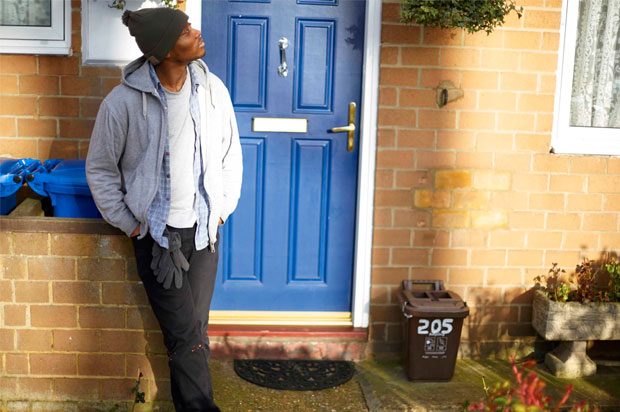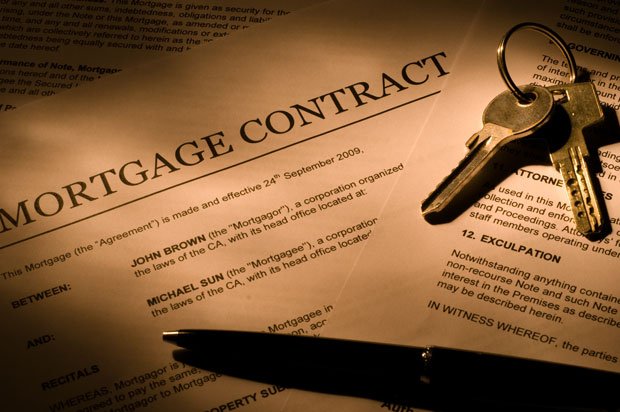How do mortgages work in the UK?

Hmm, can I afford this place?
Thinking about buying your own place sometime in the future? Chances are you’ll need a mortgage. You’ve probably heard of them, but what is a mortgage? And how do mortgages work in the UK? Before you get overwhelmed by talk of interest rates and other jargon, have a read of our simple guide to mortgages. For more information about buying a property, check out our guide to the process of buying a house in the UK.
What is a mortgage?
Basically it’s a whopping great loan from a bank or building society to buy a property. They can last anywhere from 10 years to 35 or more. 25 years used to be the norm but nowadays many first time buyers are being forced to go for 30 or 35 years because property is so expensive. Like any other type of loan, you’ll pay interest on your monthly repayments. It sounds simple but there’s a huge range of different types of mortgage out there as well as different methods of paying it back, so it can be confusing.
How much can I borrow?
Most mortgage lenders require at least a 5% deposit. Then the amount you can borrow is usually calculated at around four and half times your gross monthly salary (before tax) – you can work out roughly how much you can borrow by multiplying your income by four and a half or using an online mortgage calculator. Some lenders, however, base their calculations on your incoming and outgoing costs each month (which they refer to as affordability), so it’s always best to ask.
Mortgages for self employed people
Mortgages for self employed people work slightly differently. If you’re self-employed, the amount you can borrow is based on your income after tax (known as your net income). You’ll typically need at least three years’ worth of accounts and may be restricted to certain lenders. A mortgage broker can be really helpful for self employed people looking for the best deal.
Mortgages for people with a side hustle
If you have a regular full time job and also do a bit of work for yourself on the side, this can help you borrow a bit more mortgage money from the bank. Your full time job will be treated as your main income and you’ll need to supply some evidence from your self assessment tax returns to prove your additional income.
What is a mortgage broker?
A mortgage broker is someone who surveys all of the available mortgages to find you the best deal that they think you’ll get approved for. They work for themselves, not for a bank, so they should be impartial and can advise you on the different rules banks use to decide if they’ll lend to you. From there they can help you apply, submit your details to the bank and manage the process. Their fee can be anywhere from £100 to £400. You don’t need to use one, but they can save you a lot of time and money and sometimes have access to better rates.
Banks usually have their own mortgage brokers too, but beware, don’t get these confused with proper independent mortgage brokers. The bank’s brokers are just there to hustle you along into getting one of their own deals and won’t let you know about better deals elsewhere.
How do I repay my mortgage?
As your loan is made up of the amount you want to borrow (known as the capital) plus interest, one of the most important things to consider is how you pay this back. You have two options:
- Repayment mortgages: Each month you pay off a little of the capital, as well as interest on the loan. At the end of the term the mortgage is cleared. It’s the easiest to understand and least risky mortgage type.
- Interest-only mortgages: With this type of mortgage you only pay the interest on the loan. At the end of the mortgage term you’re expected to repay the capital. It’s totally up to you how you save for this – investment, inheritance or saving in a high-interest account – but if you’re relying on investments it takes on a whole new element of risk.
What are the different types of mortgages?
Because of the size of the loan, there isn’t one type of mortgage that’s best for everyone. The range of mortgages out there is huge, but the four main types are:
Fixed rate
These fix the rate of interest you pay – usually for the first two to five years – although longer-term deals are available. This is usually best for first time buyers as you know exactly what your costs will be each month.
- Pros: You can budget accurately without having to worry about a sudden increase in your monthly payments if interest rates rise.
- Cons: Once the fixed term comes to an end, your monthly payments will return to your lenders’ standard variable rate (SVR) – the lender’s own rate of interest – which will be higher. If you don’t want to pay this you can take out another fixed rate mortgage. You’ll usually be charged a fee to ‘buy’ this new fixed rate but it’s usually cheaper than paying the SVR.
Variable rate
There are several kinds of variable rate mortgage deals, but the most common is known as a ‘base rate tracker’. This ‘tracks’ UK interest rates (known as the base rate) usually by a certain margin above. Again, this could last for a designated amount of years, or the life of the loan.
- Pros: Great when interest rates are low.
- Cons: Not so great when they go up.
Capped rate
This literally ‘caps’ the rate you pay. So you’ll always know the maximum amount, but your payments will fall if either the base rate or the lender’s SVR drops – depending on how the mortgage is priced.
- Pros: Your payments will be lower if the base rate or lender’s SVR drops.
- Cons: You’ll have to budget for the maximum level.
Discounted rate
This is when you will receive an initial discount off the lender’s SVR for an agreed period of time.
- Pros: The discount is a welcome financial relief while it lasts.
- Cons: Unlike the base rate, your lender can alter its SVR as and when it wants to.
There are also newer kinds of mortgages that promise to save you money in the long run, such as flexible, current account and offset mortgages. However, you generally have to pay more for these mortgages.
This is why an independent mortgage broker can be helpful, they can advise on what’s best for you and what you’re most likely to be approved for.
What is a help to buy mortgage?
Help to buy mortgages were a scheme set up by the government to help people who found it difficult to save up enough for a deposit. It used to be the case that the lowest deposit you could get a mortgage with was 10% of the total price. Help to buy mortgages meant that you could do it with 5% and borrow the rest from the government. You still had to pay interest on the extra borrowing, but not for the first five years of ownership. There were restrictions on how help to buy mortgages could be used, for example they were only available to first time buyers and they had to be purchasing a new build property. The scheme ended in March 2023, since then many banks have introduced 5% mortgages which offer some of the benefits of the help to buy scheme but with less restrictions on what you can buy and no additional loan needed from the government.
How much are mortgage fees?
At first glance, some deals may appear too good to be true, so it’s important to look out for the fees charged by the lender. Typical mortgage fees can vary and include booking and set-up fees, as well as early redemption penalties, which are extra costs if you try to pay back your mortgage early (because the bank’s interest is their profit). Expect to pay anything from £200 to £2500. Since the fees can vary, be sure to ask your bank or broker about them. Also, look out for any special clauses.
What happens if I can’t pay my mortgage?
Finding yourself skint and unable to pay your mortgage is undoubtedly a gut-wrenching situation. But as stressful as this may be, please don’t ignore it. See our article about mortgage arrears for help.
See our article about borrowing money for more information about loans and debt.
Next Steps
- Shelter's advice website for young people offers help with housing problems and a free helpline 0808 800 4444. If you're in Scotland, use http://scotland.shelter.org.uk/ instead.
- Chat about this subject on our Discussion Boards.
By
Updated on 29-Sep-2015
No featured article










